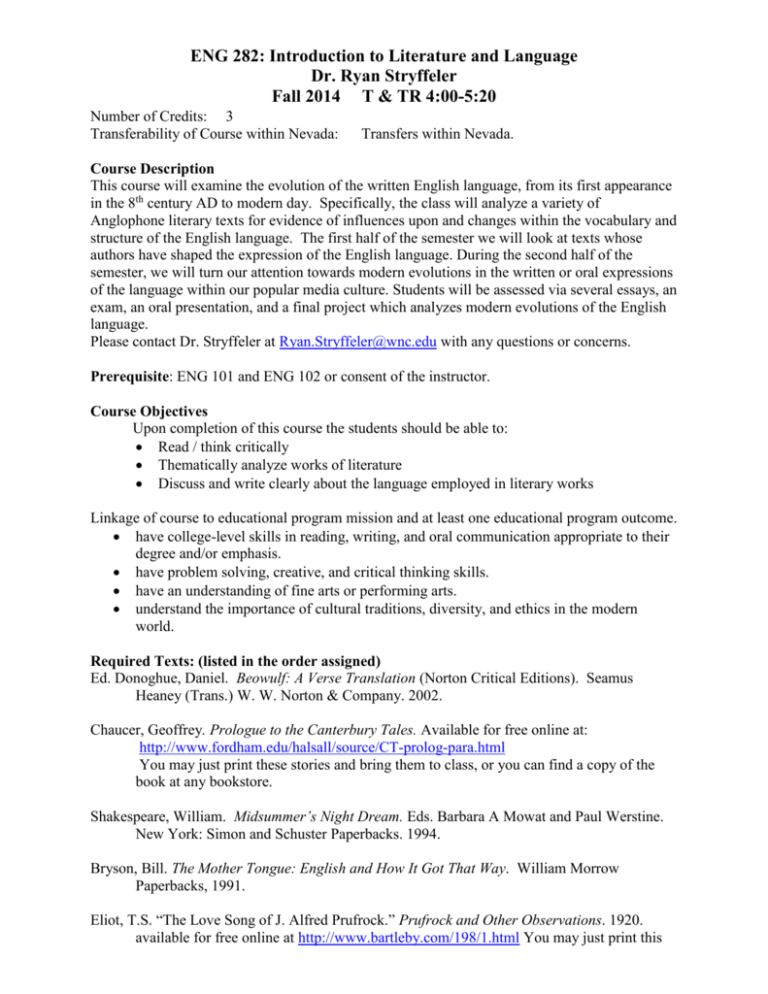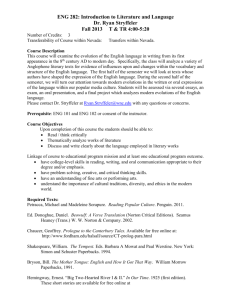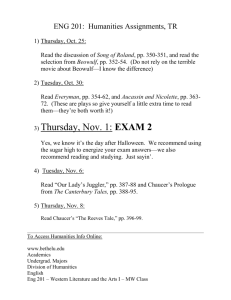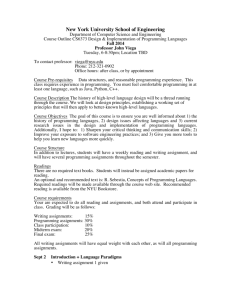ENG 282 (All Sections): Introduction to
advertisement

ENG 282: Introduction to Literature and Language Dr. Ryan Stryffeler Fall 2014 T & TR 4:00-5:20 Number of Credits: 3 Transferability of Course within Nevada: Transfers within Nevada. Course Description This course will examine the evolution of the written English language, from its first appearance in the 8th century AD to modern day. Specifically, the class will analyze a variety of Anglophone literary texts for evidence of influences upon and changes within the vocabulary and structure of the English language. The first half of the semester we will look at texts whose authors have shaped the expression of the English language. During the second half of the semester, we will turn our attention towards modern evolutions in the written or oral expressions of the language within our popular media culture. Students will be assessed via several essays, an exam, an oral presentation, and a final project which analyzes modern evolutions of the English language. Please contact Dr. Stryffeler at Ryan.Stryffeler@wnc.edu with any questions or concerns. Prerequisite: ENG 101 and ENG 102 or consent of the instructor. Course Objectives Upon completion of this course the students should be able to: Read / think critically Thematically analyze works of literature Discuss and write clearly about the language employed in literary works Linkage of course to educational program mission and at least one educational program outcome. have college-level skills in reading, writing, and oral communication appropriate to their degree and/or emphasis. have problem solving, creative, and critical thinking skills. have an understanding of fine arts or performing arts. understand the importance of cultural traditions, diversity, and ethics in the modern world. Required Texts: (listed in the order assigned) Ed. Donoghue, Daniel. Beowulf: A Verse Translation (Norton Critical Editions). Seamus Heaney (Trans.) W. W. Norton & Company. 2002. Chaucer, Geoffrey. Prologue to the Canterbury Tales. Available for free online at: http://www.fordham.edu/halsall/source/CT-prolog-para.html You may just print these stories and bring them to class, or you can find a copy of the book at any bookstore. Shakespeare, William. Midsummer’s Night Dream. Eds. Barbara A Mowat and Paul Werstine. New York: Simon and Schuster Paperbacks. 1994. Bryson, Bill. The Mother Tongue: English and How It Got That Way. William Morrow Paperbacks, 1991. Eliot, T.S. “The Love Song of J. Alfred Prufrock.” Prufrock and Other Observations. 1920. available for free online at http://www.bartleby.com/198/1.html You may just print this poem and bring it to class, or you can find a copy of the book at any bookstore. Hemingway, Ernest. “Hills like White Elephants.” Snows of Kilimanjaro and Other Stories. 1925 Please print out the story by downloading the PDF via the link listed http://www.google.com/url?sa=t&rct=j&q=&esrc=s&source=web&cd=4&ved=0CD4QFjAD&url=http%3 A%2F%2Fwww.massey.ac.nz%2Fmassey%2Ffms%2FColleges%2FCollege%2520of%2520Humanities% 2520and%2520Social%2520Sciences%2FEMS%2FReadings%2F139.105%2FAdditional%2FHills%2520 Like%2520White%2520Elephants%2520%2520Ernest%2520Hemingway.pdf&ei=99XrU9mrMpGBogTv0oDABA&usg=AFQjCNEWTSGtL3DftL 5JAnqQ7QMMSvOTVw&bvm=bv.73231344,d.cGU. or you can find a copy of the book at any bookstore. Petracca, Michael and Madeleine Sorapure. Reading Popular Culture. Penguin. 2011. INSTRUCTOR AVAILABILITY: Instructor: Dr. Ryan Stryffeler (pronounced Dr. Streef-ler) Office: BRIS 350 M Phone Number: 775-445-4284. Email: Ryan.Stryffeler@wnc.edu Please use email to contact me. My office hours for student concerns are: Monday & Wednesday: 1:00 – 2:30pm Tuesday & Thursday: 2:30 – 4:00pm These are the times that I should generally be available to meet with students. Please feel free to stop in any time during these designated hours. Other office hours are by appointment only; I am willing to make time for you, but please talk to me in advance. COURSE ASSIGNMENTS: Responses to the reading assignments 10@ 20points apiece = Short Analysis paper # 1 Mid-Term Exam Cultural Presentation Proposal/Annotated Bibliography Research paper Accumulated grade will be taken out of 1000 points total. (200 pts.) (200 pts.) (150 pts.) (100 pts.) (100 pts.) (250 pts.) EVALUATION METHODS AND GRADING CRITERIA: For average work, you will earn an average grade, which is a "C". A further important item of note: in general, papers that do not meet the minimum page/word count requirements will earn a grade no higher than a "C-". Major projects (the essays, presentation, and the exam) must be completed in order to pass the class. Participation weighs in more heavily in this course than in most others - you are expected to contribute to class discussions regularly. I am here to guide you. When you have questions, ask. But I also place great responsibility on your shoulders. You must take an active role in your education. Sitting here, trying just to "absorb" what is going on is not likely to help you much. Learn to read carefully and ask questions as soon as you feel lost. I encourage any student needing to request accommodations for a specific disability to contact the DSS coordinator, Susan Trist (445-3275), at your earliest convenience to ensure timely and appropriate accommodations. COURSE POLICIES AND EXPECTATIONS: Attendance Attendance is neither required nor noted. However, you must turn in a 2 paragraph (minimum) typed response to each reading assignment every Thursday, so make sure you are on time and prepared. You may not “make-up” these reader-responses: if you miss class, you will miss the opportunity to earn those points that day. Furthermore, you are responsible for the material covered in class. If you miss a class, make sure to get the notes, announcements, etc. from a classmate. WITHDRAWAL PROCESS AND RESPONSIBILITY: In order to withdraw from a class, a student must fill out the requisite paperwork before the final withdrawal date. I will not withdraw you from this course; you must do it yourself! You will earn a grade for work completed during the semester unless you properly drop the course through the registration office. If a student simply stops attending class, or fails to turn in major assignments, a grade of “F” will be issued as the final grade. LAST DATE TO DROP: October 24th, 2014 Late Work I will not accept late work. There are absolutely no exceptions to this policy! If an emergency arises, please contact me ASAP. Communication with me before an assignment is due provides you the only means to explain unforeseen circumstances and exercise other options. PLEASE NOTE: Print out your work at least the day before and/or email it to yourself so that you are able to retrieve it anywhere. Computer and/or printer failure are NO excuse. If it is not turned in during the class period in which it is due, you will earn zero points for the assignment. This means that if you choose to not to complete an assignment by the due date and receive zero points, you will still need to complete it before the end of the semester in order to attempt to pass the course via the points you have earned. Cell Phone/Electronic Devices: While Cell phones and iPods are convenient, their presence in the classroom can be distracting to your fellow colleagues and myself. All devices of this type should be turned off or switched to a vibrate setting while you are in class. Failure to do so will initially result in a warning; subsequent violations of this policy may result in an absence for the day and dismissal from class. This policy includes texting during class, headphones covering the ears, or using laptops for entertainment purposes, such as Facebook! Common Civility Entering a college classroom demands that you treat others in a manner that is supportive of academic inquiry, curiosity, and shared learning. This course will contain material that you may find challenging or offensive. Consequently, if you are able to argue and discuss topics in a civil and reasoned manner (even those you feel most passionate about), you will have empowered your own voice and increased the likelihood that you will be heard and taken seriously by a professional audience. Common respect involves being adult enough to not disturb others with side conversations. In this class, only one person should be talking at a time. Whether it is the instructor or a classmate, please give the individual speaking your full attention. Failure to be civil and courteous to your colleagues and/or professor will result in a loss of attendance/quiz points or dismissal from the course. Academic Honesty The College is committed to academic integrity in all its practices. Cheating on papers, tests or other academic works is a violation of College rules. No student shall engage in behavior that, in the judgment of the instructor of the class, may be construed as cheating. This may include, but is not limited to, plagiarism or other forms of academic dishonesty such as the acquisition without permission of tests or other academic materials and/or distribution of these materials and other academic work. This includes students who aid and abet as well as those who attempt such behavior. BUYING an essay or willfully submitting someone else's work as your own are instances of academic dishonesty that will result in failure of the class, at the very least. In a word – do not even consider it. In addition, you may not turn in papers written for another class to fulfill the assignments for this one. Acts of academic dishonesty will result in an F grade for an assignment or for the course, based upon the discretion of the instructor. Please refer to the student handbook for more information of the College’s academic dishonesty policies. Continued enrollment in this course indicates that you have read and agree to follow the course policies and procedures discussed herein. Reading Schedule for ENG 282 Fall 2014 1. You will need to turn in a minimum of two well-developed paragraphs responding to the week’s reading assignments each Thursday. Please type these responses in MLA format. They may be subjective, but please make sure they are specific if you wish to receive the full 20 points 2. Reading assignments for each day are listed below. Please be sure that you have completed the listed reading for that date before you come to class that day. You are expected to read the biographical/cultural information that precedes each author. Quiz questions will be drawn from the biographical information, as well as from the literary selection. 3. This schedule may change substantially as interest and discussion dictate. Any changes will be noted in class. ENG 282 Tentative Course Schedule Week One - Introductions Tuesday, August 26th - Overview to the course: syllabus and expectations Thursday, August 28th - Discussion over the origins of written language and its evolution. Week Two- Old English September 2nd and September 4th – No Class (I will be out of town this week) Week Three- Old English September 9th - Read Beowulf p. 3-22. Read “Old English Language and Poetics” p. xv-xxii Sept. 11th - Read Beowulf p. 23-56 Read “A Translator’s Introduction” p. xxiii-xxxviii Week Four - Old English Sept. 17th - Finish Beowulf Read “The Beowulf Manuscript” p. 81 Sept. 19th - Read “Beowulf’s Name”p.98 Read “The Christian Language and Theme of Beowulf” p. 196 Week Five - Middle English Sept. 23rd – Read Prologue to The Canterbury Tales Sept. 25th – Read The Wife of Bath’s Tale Week Six – Early Modern English Sept. 30th - Read Midsummer Night’s Dream, Act 1 Read Handout on Shakespeare’s Midsummer Night’s Dream October 2nd - Read Midsummer Night’s Dream, Acts 2-3 Week Seven – Early Modern English October 7th - Read Midsummer Night’s Dream, Acts 4-5 October 9th - Wrap-Up discussion of Middle English and Shakespeare Week Eight – Hallmarks of Modern English October 14th - Read Bryson, Mother Tongue Oct. 16th - Read chapters from Bryson, Mother Tongue Short Literary Analysis Essay due! Week Nine – Modern English October 21st – Read T.S. Eliot “The Love Song of J. Alfred Prufrock” October 23rd – Read Hemingway, “Hills Like White Elephants” Week Ten – Midterm Exam Oct. 28th – Review for the midterm exam Oct. 30th – midterm exam Week Eleven – Language and the Manipulation of Human Behavior - From this point forward, all reading assignments come from our Reading Popular Culture textbook, unless otherwise noted. Nov. 4th – Read “Brainworms, Sticky Music, and Catchy Tunes” p. 99 Read Chapter 1 p. 1 Nov. 6th – Read “Thumbspeak” p. 27 Read “When Texting is Wrong” p. 32 Week Twelve – Movies as Textual Language Nov. 11th – Veteran’s Day!! No Class Nov. 13th – Read “On Romantic Comedy in the New Millennium” p. 284 Abstract/Annotated Bibliography Due!! Week Thirteen – The Influence of Reading in the Modern Era Nov. 18th – Read “Twilight of the Books” p. 335 Read “J.K. Rowling’s Ministry of Magic” p. 319 Nov. 20th – Read “Talk to the Animals” p. 327 – Read “Reading Peanuts. . .” p. 348 Week Fourteen – More film November 25th – Read “Film Criticism in Review” p. 250 Read “Why We Crave Horror Movies” p. 260 Nov. 27th - Thanksgiving! NO CLASS (college is closed). Week Fifteen December 2nd – Student Presentations December 4th – Student Presentations Week Sixteen – Finals Week December 9th – Final Research Project Due!!!! December 11th – Pick up final project (graded) and goodbyes! Have a happy holiday!







